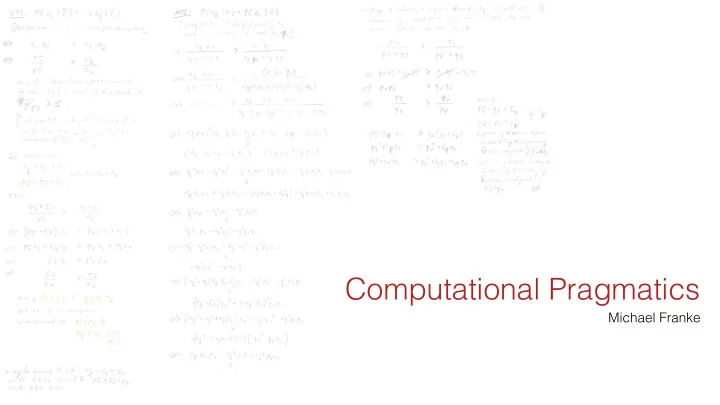

Computational Pragmatics Michael Franke
Two views of language disambiguated by ambiguous pragmatic reasoning structure function
Language use & pragmatic inference “If I say to any one, ‘ I saw some of your children to-day ’, he might be justified in inferring that I did not see them all, not because the words mean it, but because, if I had seen them all, it is most likely that I should have said so.” (Mill 1867)
Language use & pragmatic inference Maxims of Conversation Be truthful, informative, relevant, brief, clear … “[O]ne of my avowed aims is to see talking as a special case or variety of purposive, indeed rational, behaviour.” (Grice 1975)
Grammaticalism language as a formal system embedding in compositional Chierchia, Fox, Spector, Magri Neo-Grice semantics Gazdar, Horn, Atlas, Levinson, Russell, Sauerland, Schulz, van Rooij, Spector, n o i t a n z o i t a i t a m z e i l Optimality theory t a s m y s r o f Blutner, Zeevat, Hendriks, Gricean de Hoop, Jäger, Mattausch, Aloni, Krifka ideas e v o r l e . / d c u o g c t n i o . n f o u n d a Game theory t iterated reasoning i Post-Gricean o n RSA communication interaction & Parikh, Jäger, Benz, van Rooij, Jäger, Franke, Sperber, Wilson, Carston Benz, van Rooij Rothschild, Pavan, Stevens meanwhile Theoretical Economics elsewhere Cognitive Science rational communication probabilistic (Bayesian) modeling message credibility
Pragmatics from rational social reasoning situation ∀ “I saw some of your children today.” ? ? situation ∃ ¬ ∀
Pragmatics from rational social reasoning literal interpreter rational speaker rational interpreter ∀ ∀ ∀ “all” “all” “all” ∀ ∃ ¬ ∀ “some” ∃ ¬ ∀ “some” “some” ∃ ¬ ∀
Pragmatics from rational social reasoning rational interpreter rational speaker literal interpreter
Pragmatics from rational social reasoning ∀ ∃ ¬ ∀ “all” rational interpreter 1 0 “some” 0 1 “all” “some” 1 0 ∀ rational speaker 0 1 ∃ ¬ ∀ ∃ ¬ ∀ ∀ “all” literal interpreter 1 0 “some” .5 .5
Pragmatics from rational social reasoning ∀ ∃ ¬ ∀ “all” rational interpreter .9 .1 “some” .1 .9 “all” “some” approximately .9 .1 ∀ rational speaker .1 .9 ∃ ¬ ∀ ∀ ∃ ¬ ∀ “all” literal interpreter 1 0 “some” .5 .5
Pragmatics from rational social reasoning listener behavior ∀ ∃ ¬ ∀ U → ∆ ( S ) “all” rational interpreter .9 .1 “some” .1 .9 “all” “some” speaker behavior approximately .9 .1 ∀ rational speaker S → ∆ ( U ) .1 .9 ∃ ¬ ∀ ∀ ∃ ¬ ∀ “all” literal interpreter 1 0 “some” .5 .5
Rational Speech Act model P L 1 ( s | u ) ∝ P S 1 ( u | s ) · P ( s ) L 1 pragmatic listener P S 1 ( u | s ) = exp( α (log P L 0 ( s | u ) − Cost( u ) )) S 1 pragmatic speaker | {z } Exp.Utility( u | s ) P L 0 ( s | u ) = P ( s | [ [ u ] ]) L 0 literal listener
Rational Speech Act model P L 1 ( s | u ) ∝ P S 1 ( u | s ) · P ( s ) L 1 pragmatic listener P S 1 ( u | s ) = exp( α (log P L 0 ( s | u ) − Cost( u ) )) S 1 pragmatic speaker | {z } Exp.Utility( u | s ) world knowledge P L 0 ( s | u ) = P ( s | [ [ u ] ]) L 0 literal listener semantic meaning
Rational Speech Act model P L 1 ( s | u ) ∝ P S 1 ( u | s ) · P ( s ) L 1 pragmatic listener linguistic preference rational choice P S 1 ( u | s ) ∝ exp( α (log P L 0 ( s | u ) − Cost( u ) )) S 1 pragmatic speaker | {z } Exp.Utility( u | s ) information flow P L 0 ( s | u ) = P ( s | [ [ u ] ]) L 0 literal listener
Rational Speech Act model speaker model P L 1 ( s | u ) ∝ P S 1 ( u | s ) · P ( s ) L 1 pragmatic listener Bayes rule world knowledge P S 1 ( u | s ) = exp( α (log P L 0 ( s | u ) − Cost( u ) )) S 1 pragmatic speaker | {z } Exp.Utility( u | s ) P L 0 ( s | u ) = P ( s | [ [ u ] ]) L 0 literal listener
This course applications technicalities WebPPL referential communication Bayesian Data Analysis (epistemic) scalar implicatures … non-literal language use vagueness politeness …
referential communication context set of objects/referents utterances U = { ”square” , ”circle” , ”green” , ”blue” } single properties of objects which object do you think a speaker meant when she selects “blue”?
RSA for reference games (example) “square” .82 0 .18 rational interpreter “circle” 0 1 0 “green” 0 0 1 “blue” .82 .18 0 “square” “circle” “green” “blue” .5 0 0 .5 rational speaker 0 .89 0 .11 .89 .11 0 0 “square” .5 0 .5 literal interpreter “circle” 0 1 0 “green” 0 0 1 “blue” .5 .5 0
Recommend
More recommend